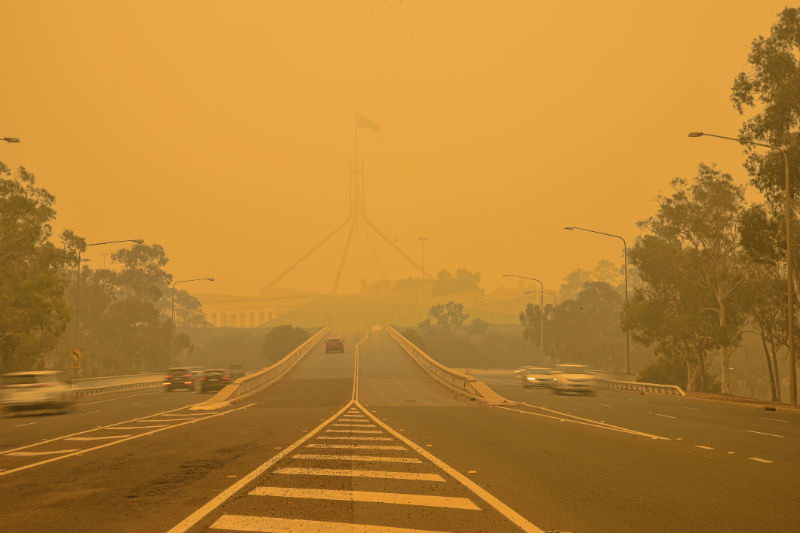- Binoy Kampmark
- 30 July 2020
It all began as a spur of inspiration. Katta O’Donnell, now in her fifth year of law studies at La Trobe University, was cerebrally tickled by a lecture on climate risk by David Barnden of Equity Generation Lawyers. Minds met; ideas exchanged. ‘It’s time the government told the public about the impact climate change will have on our future and the economy,’ O’Donnell insisted.

On July 22, the adventurous pupil filed an action in the Federal Court in Victoria hoping to make good her promise to put the government on trial for ‘misconduct’. The action notes that, ‘At all material times there has existed a significant likelihood that the climate is changing, and will continue to change, as the result of anthropogenic influences.’ Australia was ‘materially exposed and susceptible’ to the risks posed by climate change.
O’Donnell seeks to subject the government to trial via the mechanism of sovereign bonds, deemed some of the safest forms of investments. These involve investments made to governments at a fixed interest rate for a set period and typically form the bedrock of Australia’s superannuation funds. Such investors, she argues, need to be informed by the government, to an adequate standard of legal care, about climate change risks.
The action contends that considerations of climate change risk ‘can have a serious material impact on a decision by an investor to invest in Sovereign bonds and on the value of Sovereign bonds.’ In lending money to the government, investors were entitled to be appraised of these risks, being ‘material to [their] decision to trade in exchange-Australian government bonds (e-AGBs)’. Not doing so potentially imperilled the economy and constitutes misleading and deceptive conduct.
O’Donnell analogises that conduct of care with those of company directors. An assortment of legal opinions in Australia have previously suggested that company directors ‘can and in some cases should be considering the impact on their business of climate change risks, to the extent they intersect with the firm.’ In 2019, a legal opinion drafted by Noel Hutley SC and Sebastian Hartford Davis noted the ‘developments in the state of scientific knowledge’, an increased number of interventions by Australian regulators and the greater concern shown by investors in climate change issues. ‘In our opinion, these matters elevate the standard of care that will be expected of a reasonable investor.’
This action is singular and optimistic. Australian judges will find wading into the field of climate change science vis-à-vis government investment policies a difficult matter. That said, after the United States, Australia is the place to initiate climate change proceedings, notably in the field of administrative law. Government decisions approving high-emission projects have notably found their way into the courts.
'This action is singular and optimistic. Australian judges will find wading into the field of climate change science vis-à-vis government investment policies a difficult matter.'
In February 2019, a proposed open-cut coal mine in the Gloucester Valley in New South Wales was rejected in what was a startling decision for watchers of the fossil fuel industry. ‘In this case,’ concluded Chief Justice Preston of the NSW Land and Environment Court, ‘the exploitation of the coal resources in the Gloucester Valley would not be a sustainable use and would cause substantial environmental and social harm.’ The justice also accepted that ‘direct and indirect GHG [greenhouse gas] emissions of the Rocky Hill Project will impact on the environment.’ Arguments that emissions would be offset by reductions in electricity generation and transport, and the use of ‘sinks’ (ocean, terrestrial vegetation or soils) were rejected as ‘speculative and hypothetical’.
There are also international precedents on public efforts to compel changes in government policy on climate change. One stands out in its audacity. In December 2019, the Dutch case of Urgenda Foundation v. Netherlands revealed for the first time how the common citizenry might compel their government through a court to make changes to climate change policy, using the hook of human rights. The Dutch Supreme Court affirmed the finding of the appellate court which, in turn, upheld the original decision that the government cut its greenhouse gas emissions by at least 25 per cent by the end of 2020 (compared to 1990 levels). The Dutch State expressed agreement that the risk of climate change was genuine, but insisted that political representatives, rather than activists, decide the levels of reduction.
The Supreme Court, applying the European Convention of Human Rights, noted that inadequate action in addressing climate change posed a ‘risk of irreversible changes to the worldwide ecosystems and liveability our planet’ with a ‘serious risk that the current generation of citizens will be confronted with loss of life and/or a disruption to family life… that the State has a duty to protect against.’ It was the State’s obligation ‘to protect the life and the right to private and family life of its residents’ and take steps to avoid foreseeable harm. O’Donnell, it would seem, has firm and growing shoulders to stand upon.
 Dr Binoy Kampmark is a former Commonwealth Scholar who lectures at RMIT University, Melbourne.
Dr Binoy Kampmark is a former Commonwealth Scholar who lectures at RMIT University, Melbourne.
No comments:
Post a Comment